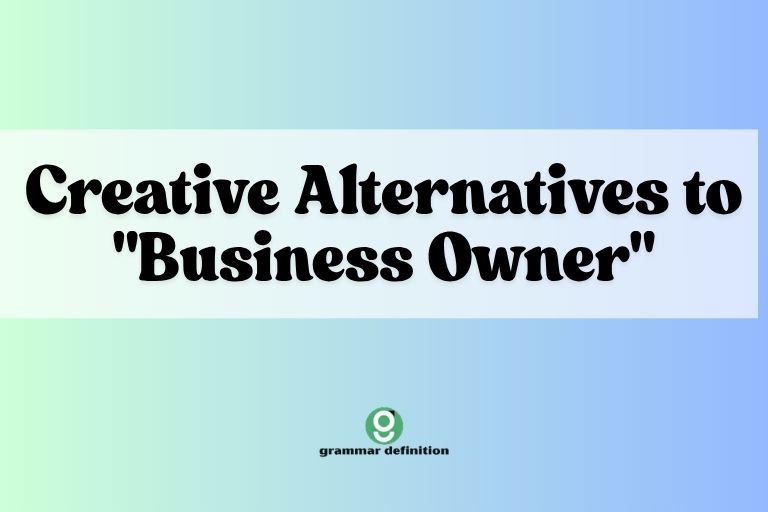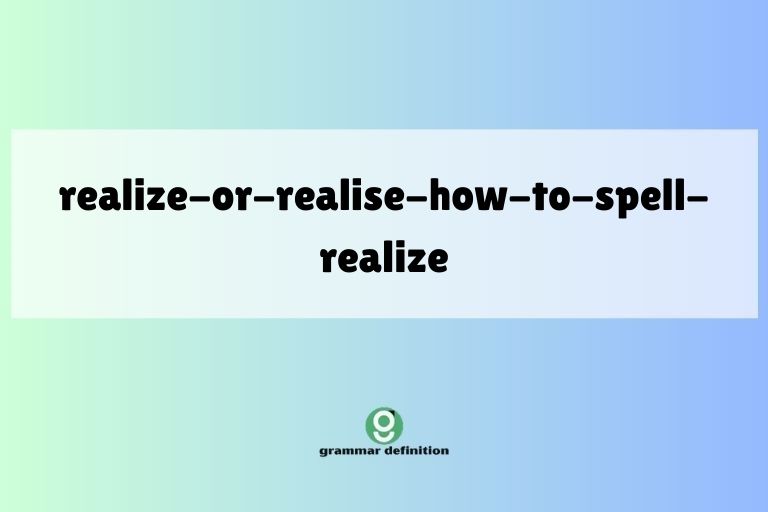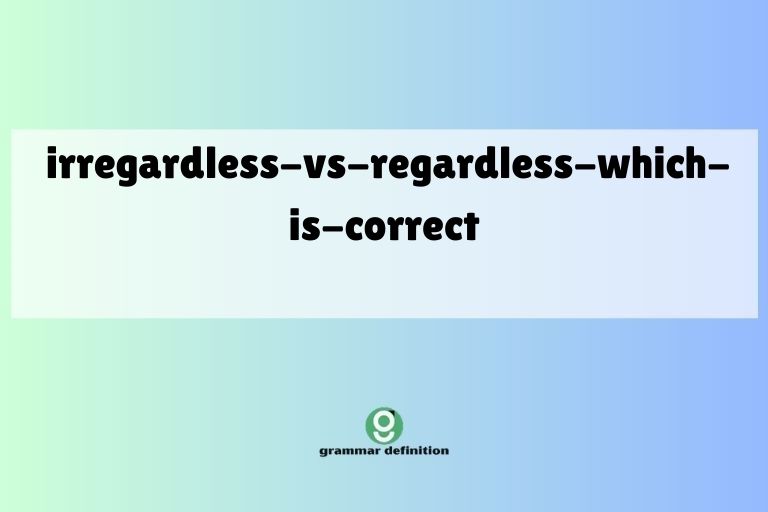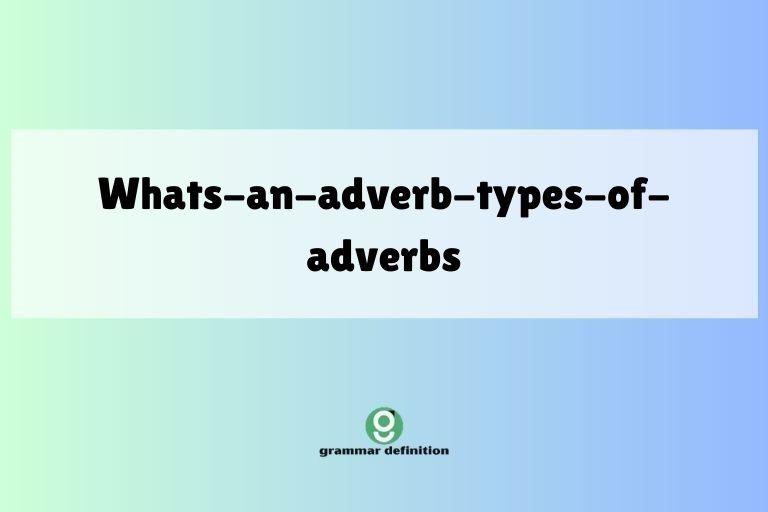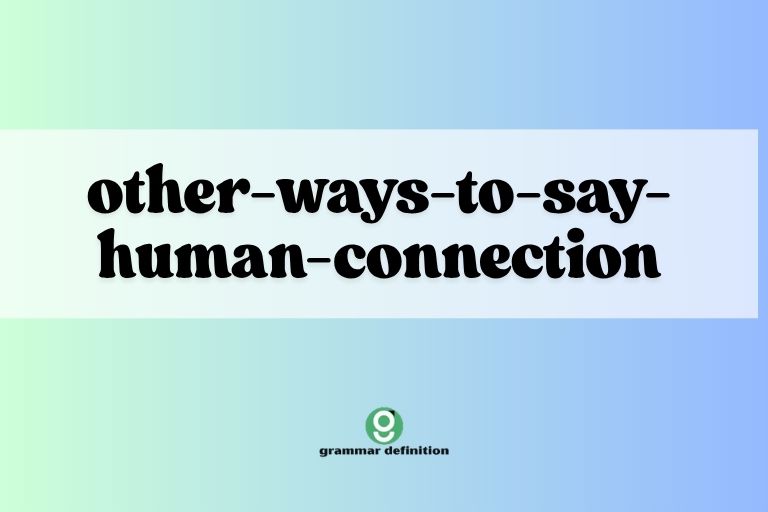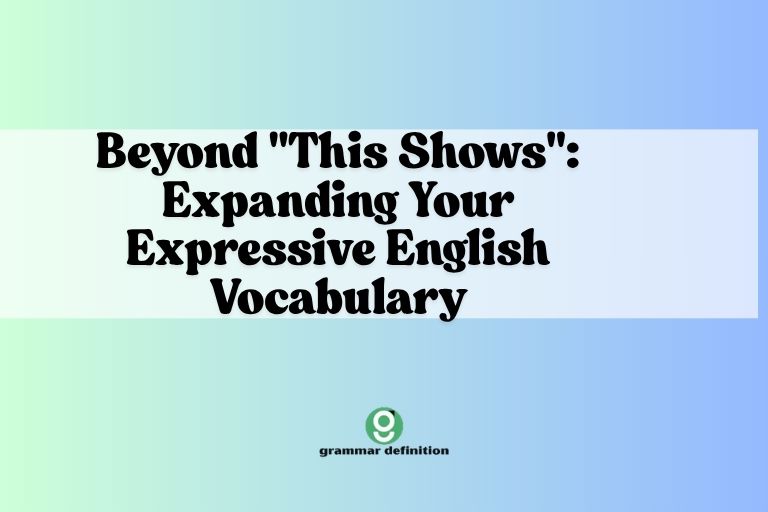Infinitive Phrases: Definition, Usage, and Examples
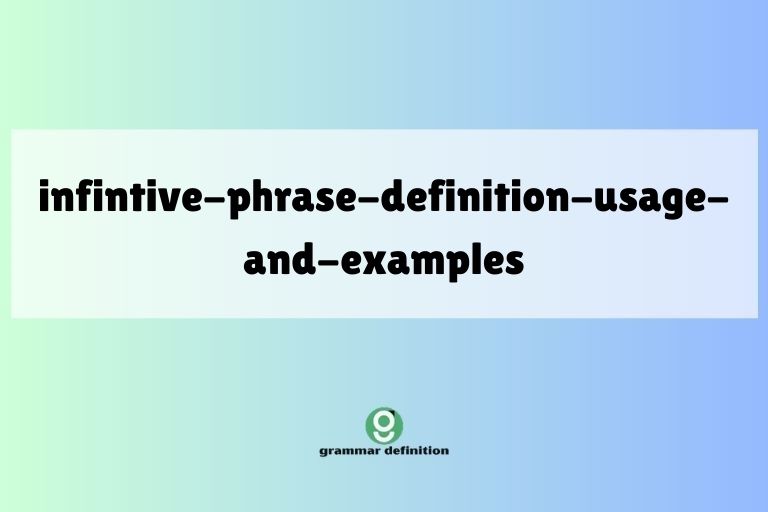
Understanding infinitive phrases is crucial for mastering English grammar. These versatile phrases can function as nouns, adjectives, or adverbs, adding depth and complexity to your sentences.
This article provides a comprehensive guide to infinitive phrases, covering their definition, structure, types, usage rules, common mistakes, and advanced topics. Whether you’re a beginner or an advanced learner, this resource will help you confidently identify and use infinitive phrases in your writing and speaking.
Table of Contents
- Introduction
- Definition of an Infinitive Phrase
- Structural Breakdown
- Types of Infinitive Phrases
- Examples of Infinitive Phrases
- Usage Rules for Infinitive Phrases
- Common Mistakes with Infinitive Phrases
- Practice Exercises
- Advanced Topics
- Frequently Asked Questions
- Conclusion
Definition of an Infinitive Phrase
An infinitive phrase consists of an infinitive (the base form of a verb preceded by “to”) and any modifiers, complements, or objects associated with the infinitive. It functions as a single unit within a sentence, acting as a noun, adjective, or adverb. Understanding the role of each element within the phrase is key to mastering its usage. The infinitive phrase adds detail and nuance to your writing, allowing for more complex sentence structures.
In simpler terms, an infinitive phrase always starts with “to” followed by a verb (e.g., to run, to sing, to eat). However, it often includes additional words that modify the verb or complete its meaning, such as adverbs, adjectives, or objects. These additional elements enrich the phrase and provide more information. The entire phrase then acts as a noun, adjective, or adverb within the sentence.
Structural Breakdown
The basic structure of an infinitive phrase is as follows: to + verb + (optional modifiers/complements/objects). Let’s break down each component:
- To: This is the sign of the infinitive. It always precedes the base form of the verb.
- Verb: This is the base form of the verb (e.g., run, eat, study).
- Modifiers: These are adverbs or adjectives that describe the verb or related words (e.g., to run quickly, to eat healthily).
- Complements: These are words or phrases that complete the meaning of the verb (e.g., to be happy, to seem tired).
- Objects: These are nouns or pronouns that receive the action of the verb (e.g., to read a book, to help them).
It’s important to note that not all infinitive phrases will contain all of these elements. Some may be as simple as “to sleep,” while others may be more complex, such as “to quickly finish the difficult assignment.” Recognizing these elements will help you understand how the infinitive phrase functions within the sentence.
Types of Infinitive Phrases
Infinitive phrases can function as nouns, adjectives, or adverbs. The function of the phrase determines its role in the sentence and how it relates to other words.
Infinitive Phrases as Noun Phrases
When an infinitive phrase acts as a noun, it can function as a subject, object, or complement. This means it can take the place of a noun in the sentence structure.
- Subject: The infinitive phrase is the main topic of the sentence.
- Object: The infinitive phrase receives the action of the verb.
- Complement: The infinitive phrase renames or describes the subject.
Infinitive Phrases as Adjective Phrases
When an infinitive phrase acts as an adjective, it modifies a noun or pronoun. It provides more information about the noun or pronoun it describes.
Infinitive phrases used as adjectives usually come after the noun they modify. They answer the question “which one?” or “what kind of?”
Infinitive Phrases as Adverb Phrases
When an infinitive phrase acts as an adverb, it modifies a verb, adjective, or another adverb. It provides information about how, when, where, why, or to what extent the action is performed.
Infinitive phrases used as adverbs often express purpose (answering the question “why?”). They can also indicate a result or consequence.
Examples of Infinitive Phrases
Here are examples of how infinitive phrases function as nouns, adjectives, and adverbs. Each section includes a table with multiple examples to illustrate the different usages.
Infinitive Phrases as Nouns – Examples
The following table provides examples of infinitive phrases acting as nouns in different sentence positions: subject, object, and complement. Each example is annotated to clarify the function of the infinitive phrase.
| Sentence | Infinitive Phrase | Function |
|---|---|---|
| To travel the world is my dream. | To travel the world | Subject |
| She loves to read novels. | to read novels | Object |
| His ambition is to become a doctor. | to become a doctor | Complement |
| To forgive can be difficult. | To forgive | Subject |
| They decided to postpone the meeting. | to postpone the meeting | Object |
| Her goal is to improve her grades. | to improve her grades | Complement |
| To learn a new language takes time. | To learn a new language | Subject |
| He wants to buy a new car. | to buy a new car | Object |
| The key is to remain calm. | to remain calm | Complement |
| To exercise regularly is important for health. | To exercise regularly | Subject |
| She hopes to get the job. | to get the job | Object |
| My intention is to help others. | to help others | Complement |
| To understand the concept requires effort. | To understand the concept | Subject |
| They need to finish the project. | to finish the project | Object |
| Her advice is to be patient. | to be patient | Complement |
| To succeed in life requires hard work. | To succeed in life | Subject |
| He promised to call me later. | to call me later | Object |
| Our plan is to visit Europe. | to visit Europe | Complement |
| To listen carefully is essential for learning. | To listen carefully | Subject |
| I forgot to lock the door. | to lock the door | Object |
| The challenge is to overcome obstacles. | to overcome obstacles | Complement |
| To see is to believe. | To see | Subject |
| To believe is to see. | To believe | Subject |
| He attempted to climb the mountain. | to climb the mountain | Object |
| The purpose of my life is to serve humanity. | to serve humanity | Complement |
Infinitive Phrases as Adjectives – Examples
The following table provides examples of infinitive phrases acting as adjectives, modifying nouns or pronouns. Notice how the infinitive phrase usually follows the noun it modifies, providing additional information about it.
| Sentence | Infinitive Phrase | Noun Modified |
|---|---|---|
| He needs a book to read. | to read | book |
| I have a lot of work to do. | to do | work |
| She is looking for someone to help her. | to help her | someone |
| This is the best way to learn. | to learn | way |
| They need a place to stay. | to stay | place |
| He had no money to spend. | to spend | money |
| She has many things to consider. | to consider | things |
| I need a pen to write with. | to write with | pen |
| This is an opportunity to excel. | to excel | opportunity |
| He is the person to ask. | to ask | person |
| She needs a friend to talk to. | to talk to | friend |
| They have a responsibility to protect the environment. | to protect the environment | responsibility |
| I have a promise to keep. | to keep | promise |
| He found a solution to the problem. | to the problem | solution |
| She is the right candidate to lead the team. | to lead the team | candidate |
| I have a reason to be happy. | to be happy | reason |
| He is the man to see. | to see | man |
| She had a story to tell. | to tell | story |
| They have a mission to accomplish. | to accomplish | mission |
| I need a tool to fix this. | to fix this | tool |
| She found a way to succeed. | to succeed | way |
| He has a goal to achieve. | to achieve | goal |
| This is the moment to act. | to act | moment |
| He is not the person to trust. | to trust | person |
| She has a plan to follow. | to follow | plan |
Infinitive Phrases as Adverbs – Examples
The following table provides examples of infinitive phrases acting as adverbs, modifying verbs, adjectives, or other adverbs. These phrases often express purpose (“why?”) or result.
Note that these phrases usually come at the beginning or end of the sentence.
| Sentence | Infinitive Phrase | Modified Element | Purpose or Reason |
|---|---|---|---|
| He went to the library to study. | to study | went | Purpose |
| She works hard to earn money. | to earn money | works | Purpose |
| I exercise regularly to stay healthy. | to stay healthy | exercise | Purpose |
| To get a good grade, you must study hard. | To get a good grade | must study | Purpose |
| He shouted loudly to be heard. | to be heard | shouted | Purpose |
| She saved money to buy a house. | to buy a house | saved | Purpose |
| To understand the lesson, you need to pay attention. | To understand the lesson | need | Purpose |
| He practices every day to improve his skills. | to improve his skills | practices | Purpose |
| She went to Italy to learn Italian. | to learn Italian | went | Purpose |
| To succeed, you must be persistent. | To succeed | must be | Purpose |
| He was happy to see her. | to see her | happy | Reason |
| She was surprised to hear the news. | to hear the news | surprised | Reason |
| They were excited to win the game. | to win the game | excited | Reason |
| I am ready to start the project. | to start the project | ready | Reason |
| He was eager to learn new things. | to learn new things | eager | Reason |
| She was grateful to receive the award. | to receive the award | grateful | Reason |
| I called him to ask a question. | to ask a question | called | Purpose |
| She traveled to Paris to see the Eiffel Tower. | to see the Eiffel Tower | traveled | Purpose |
| He studied diligently to pass the exam. | to pass the exam | studied | Purpose |
| To avoid mistakes, read the instructions carefully. | To avoid mistakes | read | Purpose |
| She writes every day to improve her writing skills. | to improve her writing skills | writes | Purpose |
| He woke up early to catch the train. | to catch the train | woke up | Purpose |
| To fully appreciate art, one must understand its history. | To fully appreciate art | must understand | Purpose |
Usage Rules for Infinitive Phrases
Using infinitive phrases correctly requires understanding a few key rules:
- Placement: Infinitive phrases can appear at the beginning, middle, or end of a sentence, depending on their function.
- Tense: The infinitive itself does not change tense. The tense is determined by the main verb in the sentence.
- Split Infinitives: While traditionally frowned upon, splitting infinitives (placing an adverb between “to” and the verb, e.g., “to boldly go”) is now widely accepted in modern English, especially when it improves clarity and flow. However, avoid awkward or excessive splitting.
- Subject of the Infinitive: Sometimes, you need to specify who is performing the action of the infinitive. In these cases, use “for + (pro)noun” before the infinitive (e.g., “It is important for her to understand”).
- Negative Infinitives: To make an infinitive negative, place “not” before the infinitive (e.g., “to not forget,” “not to worry”).
Understanding these rules will help you use infinitive phrases accurately and effectively in your writing and speech. Paying attention to placement and the subject of the infinitive is especially important for clarity.
Common Mistakes with Infinitive Phrases
Here are some common mistakes to avoid when using infinitive phrases:
| Incorrect | Correct | Explanation |
|---|---|---|
| I enjoy to swim. | I enjoy swimming. / I like to swim. | Some verbs (like enjoy) are typically followed by gerunds (-ing forms) rather than infinitives. Like can be followed by an infinitive or a gerund with little difference in meaning. |
| He told me go. | He told me to go. | Verbs like tell require an infinitive after the object pronoun. |
| She made me to cry. | She made me cry. | Verbs like make (in the sense of “force”) take a bare infinitive (without “to”). |
| To doing exercise is good. | To do exercise is good. / Doing exercise is good. | The infinitive form is “to do,” not “to doing.” Alternatively, you can use the gerund form “doing exercise.” |
| I want he to come. | I want him to come. | Use the object pronoun (him) after want when specifying the subject of the infinitive. |
| It is important for understand. | It is important to understand. | The correct form is “to understand,” not “for understand.” |
| He went there for buy some milk. | He went there to buy some milk. | Use the infinitive form “to buy” to express purpose. |
| I helped him to cleaned the house. | I helped him clean the house. / I helped him to clean the house. | The verb “help” can be followed by either the bare infinitive (without “to”) or the full infinitive. |
By being aware of these common errors, you can improve the accuracy and clarity of your writing. Pay close attention to the verbs that precede infinitives and their specific requirements.
Practice Exercises
Test your understanding of infinitive phrases with these practice exercises. Identify the infinitive phrase in each sentence and determine its function (noun, adjective, or adverb).
Exercise 1: Identify the Infinitive Phrase and its Function
| Sentence | Infinitive Phrase | Function (Noun, Adjective, Adverb) |
|---|---|---|
| 1. To err is human. | ||
| 2. She needs a car to drive. | ||
| 3. He went to the store to buy milk. | ||
| 4. To forgive is divine. | ||
| 5. I have a task to complete. | ||
| 6. She studied hard to pass the exam. | ||
| 7. To see is to believe. | ||
| 8. He needs a friend to talk to. | ||
| 9. They traveled to Europe to see the sights. | ||
| 10. To succeed requires hard work. |
Answer Key:
| Sentence | Infinitive Phrase | Function (Noun, Adjective, Adverb) |
|---|---|---|
| 1. To err is human. | To err | Noun |
| 2. She needs a car to drive. | to drive | Adjective |
| 3. He went to the store to buy milk. | to buy milk | Adverb |
| 4. To forgive is divine. | To forgive | Noun |
| 5. I have a task to complete. | to complete | Adjective |
| 6. She studied hard to pass the exam. | to pass the exam | Adverb |
| 7. To see is to believe. | To see | Noun |
| 8. He needs a friend to talk to. | to talk to | Adjective |
| 9. They traveled to Europe to see the sights. | to see the sights | Adverb |
| 10. To succeed requires hard work. | To succeed | Noun |
Exercise 2: Rewrite the Sentences using Infinitive Phrases
Rewrite the following sentences using infinitive phrases. Make sure the meaning of the sentence remains the same.
- It is important that you study hard.
- He wants that he buys a new car.
- She needs that she finds a job.
- It is necessary that we arrive early.
- He decided that he would go to the party.
- It is essential that she learns English.
- They hope that they will win the game.
- It is important that he tells the truth.
- She wants that she visits Paris.
- He needs that he finishes the project.
Answer Key:
- It is important to study hard.
- He wants to buy a new car.
- She needs to find a job.
- It is necessary to arrive early.
- He decided to go to the party.
- It is essential to learn English.
- They hope to win the game.
- It is important to tell the truth.
- She wants to visit Paris.
- He needs to finish the project.
Advanced Topics
For advanced learners, here are some more complex aspects of infinitive phrases:
- Bare Infinitives: Some verbs (e.g., let, make, see, hear, help) take a bare infinitive (without “to”). For example, “I saw him leave.”
- Perfect Infinitives: Use a perfect infinitive (to have + past participle) to indicate an action that occurred before the action of the main verb. For example, “He seems to have forgotten his keys.”
- Passive Infinitives: Use a passive infinitive (to be + past participle) to indicate that the subject of the infinitive is receiving the action. For example, “She wants to be invited to the party.”
- Infinitive Clauses: Complex sentences can have entire clauses functioning as infinitives. For example, “His biggest fear was to fail after trying so hard.”
Mastering these advanced topics will further enhance your understanding and usage of infinitive phrases. Pay attention to the context and meaning you want to convey when choosing the appropriate infinitive form.
Frequently Asked Questions
- What is the difference between an infinitive and an infinitive phrase?
An infinitive is simply “to” followed by the base form of a verb (e.g., to run, to eat). An infinitive phrase includes the infinitive along with any modifiers, complements, or objects that relate to the verb (e.g., to run quickly, to eat a healthy meal).
- Can an infinitive phrase be the subject of a sentence?
Yes, an infinitive phrase can function as the subject of a sentence. In this case, the entire phrase acts as a noun. For example, “To learn a new language is challenging.”
- How do I identify the function of an infinitive phrase in a sentence?
Determine what the infinitive phrase is doing in the sentence. If it’s acting like a noun (subject, object, complement), it’s a noun phrase. If it’s modifying a noun or pronoun, it’s an adjective phrase. If it’s modifying a verb, adjective, or adverb, it’s an adverb phrase.
- What is a split infinitive, and is it grammatically incorrect?
A split infinitive occurs when an adverb is placed between “to” and the verb (e.g., “to boldly go”). While traditionally frowned upon, split infinitives are now widely accepted in modern English, especially when they improve clarity and flow. Avoid awkward or excessive splitting.
- How do I make an infinitive phrase negative?
To make an infinitive phrase negative, place “not” before the infinitive (e.g., “to not forget,” “not to worry”). For example, “It is important not to forget your keys.”
- Can an infinitive phrase have its own subject?
Yes, you can specify the subject of an infinitive using “for + (pro)noun” before the infinitive. For example, “It is important for her to understand the instructions.”
- Are there any verbs that should never be followed by an infinitive?
Yes, some verbs are typically followed by gerunds (-ing forms) rather than infinitives. Examples include enjoy, avoid, consider, and mind. For example, “I enjoy swimming,” not “I enjoy to swim.”
- How can I improve my understanding and usage of infinitive phrases?
Practice identifying and using infinitive phrases in various contexts. Read widely and pay attention to how infinitive phrases are used in different types of writing. Complete practice exercises and seek feedback on your writing.
Conclusion
Infinitive phrases are a powerful tool for adding depth and complexity to your writing. By understanding their structure, function, and usage rules, you can effectively incorporate them into your sentences and improve your overall communication skills.
Remember to practice regularly and pay attention to the context in which you use them.
Mastering infinitive phrases will not only enhance your grammar skills but also allow you to express your thoughts more precisely and eloquently. Continue to explore different ways to use infinitive phrases in your writing and speaking, and you’ll soon find yourself using them with confidence and ease.
Keep practicing, and you’ll see a significant improvement in your English proficiency!

